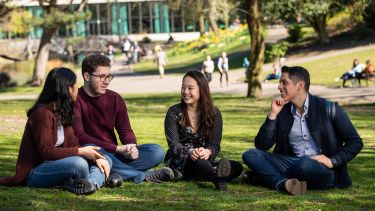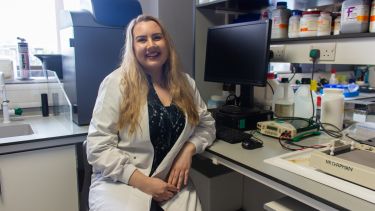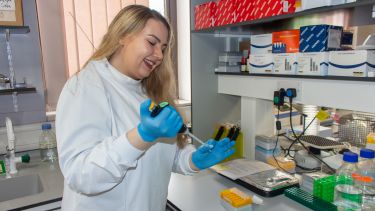I’m not just saying it, but my masters was genuinely the best year of my university experience so far

What made you decide to study Reproductive and Developmental Medicine at Sheffield?
“So I’m from Sheffield, I was born in Sheffield - I was actually born in Jessops where I work now. I did my undergraduate degree at Sheffield in Genetics and Microbiology, so I already had a positive experience of the university, and knew of the fantastic reputation of both the medical school and Jessops when it came to both teaching and research.
“Having been a ‘fertility treatment’ baby myself, I’ve always had a massive interest in reproduction ever since I was a child. This fascination was cemented after doing a reproductive module in my final year of my undergraduate degree. I absolutely loved it. I started researching to see if there were any masters in the field and coincidentally Sheffield came up! The Reproductive and Developmental Medicine MSc was right there at Jessops. I thought ‘perfect’ - I could keep living at home and carry on in a place I’m happy and comfortable.”
What did you enjoy most about the course?
“Coming from a scientific background, I really enjoyed the mixture of both scientific and clinical modules. It was interesting for me as a scientist to do the clinical side, which was something I’d never addressed before. I absolutely loved getting to learn all the theory behind these medical applications.
“In retrospect, I also loved how much we were encouraged to present as part of our module assessments. As a PhD student and researcher presenting at conferences and large groups I now do this pretty much without thinking, whereas when I came into the masters I wasn’t very confident.
The MSc taught us how to present research concisely to a variety of audiences - from fellow researchers in your field, to engagement with younger students or members of the public. At the time I wished they’d not asked us to do presentations, but in hindsight I left the course so much more confident.
Amelia Parkin-Green
“Obviously I enjoyed the research project too - so much so that it ended up being the basis of my PhD!”
That’s fantastic! Tell us more about your research project?
“So because our research projects took place during COVID, we were given the option to do an extended literature review or a dry research project. There was loads of flexibility and our tutors gave us plenty of academic and pastoral support.
“In the end I decided to focus on sequencing data so I’d have some of my own novel research. My supervisor, Dr Mark Fenwick, found data that had been generated in the lab but had been left untouched. It was up to me to analyse and interpret the data, and come up with thoughts on its meaning.
“I focused on Transforming Growth Factor Beta (TGFB) and how it keeps early follicles dormant in the ovary - something which could have some really interesting applications for fertility preservation in the future. I processed and analysed the sequencing data using bioinformatics, and continue to do that now but with more in-depth wet lab work. I enjoyed the project so much, and was so supported by Mark and the department that it felt like such a good option to carry on to do a PhD. I don’t think I would have done a PhD had it not been within this department.”
Where do you see yourself after you complete your PhD?
“I’m open to all opportunities that come my way, but I would love to lecture. I’ve been fortunate to have had a lot of teaching experience in my PhD, including teaching some of the first year medical students and supervising the lab work of current reproductive medicine MSc students. I think the roots of wanting to lecture all started with my masters course, and going from not being confident to absolutely loving it. It’s become a bit of a passion.”
What would you say to a student thinking about studying Reproductive and Developmental Medicine at Sheffield?
“I’m not just saying it, but my masters was genuinely the best year of my university experience so far. I think that’s because you’re on a course with people who are all interested in the same thing. It’s smaller and more focused than at undergrad. You gain such great friendships and professional relationships, and it’s because everyone is so like-minded.
“My advice to prospective students would be to go into it with an open mind and take all opportunities that come your way. Embrace both sides of the course - the clinical and the science.
“As for Sheffield, you’re never more than 20 minutes away from the countryside, so make sure to enjoy all that green space. I also didn’t realise I could still get involved with societies as a masters student, so make sure to join in with all the social experiences available at Sheffield. They really are fantastic.”

International postgraduate taught scholarships
We're offering scholarships worth up to £3,000 to international students joining the University to study a taught masters programme in September 2026.


